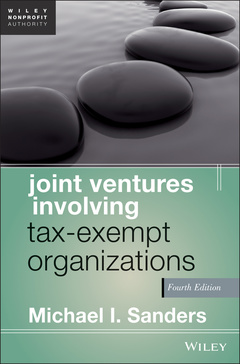Description
Joint Ventures Involving Tax-Exempt Organizations (4th Ed.)
Wiley Nonprofit Authority Series
Author: Sanders Michael I.
Language: English
Subject for Joint Ventures Involving Tax-Exempt Organizations:
Keywords
Michael Sanders, joint ventures, Section 501(r), Form 990, New Market Tax Credits, low income housing tax credits, historic tax credits, nonprofit organizations, good governance, social entrepreneurship, Rev, Rul, 98-15, IRS audits, UBIT, charitable organizations, social benefit corporations, ancillary joint ventures, universities, single member LLCs
1472 p. · 18x25.4 cm · Hardback
Description
/li>Contents
/li>Biography
/li>
Joint Ventures Involving Tax-Exempt Organizations, Fourth Edition examines the liability of, and consequences to, exempt organizations participating in joint ventures with for-profit and other tax-exempt entities. This authoritative guide provides unbridled access to relevant IRC provisions, Treasury regulations, IRS rulings, and pertinent judicial decisions and legislative developments that impact exempt organizations involved in joint ventures.
- Features in depth analysis of the IRS's requirements for structuring joint ventures to protect a nonprofit's exemption as well as to minimize UBIT
- Includes sample models, checklists, and numerous citations to Internal Revenue Code sections, Treasury Regulations, case law, and IRS rulings
- Presents models, guidelines, and suggestions for structuring joint ventures and minimizing the risk of audit
- Contains detailed coverage of: new Internal Revenue Code requirements impacting charitable hospitals including Section 501(r) and related provisions; university ventures, revised Form 990, with a focus on nonprofits engaged in joint ventures; the IRS's emphasis on good governance practices; international activities by nonprofits; and a comprehensive examination of the New Market Tax Credits and Low Income Housing Tax Credits arena
Written by a noted expert in the field, Joint Ventures Involving Tax-Exempt Organizations, Fourth Edition is the most in-depth discussion of this critical topic.
Preface xxv
Acknowledgments xxix
About the Author xxxi
Chapter 1: Introduction: Joint Ventures Involving Exempt Organizations 1
Chapter 2: Taxation of Charitable Organizations 49
Chapter 3: Taxation of Partnerships and Joint Ventures 193
Chapter 4: Overview: Joint Ventures Involving Exempt Organizations 291
Chapter 5: Private Benefit, Private Inurement, and Excess Benefit Transactions 409
Chapter 6: Engaging in a Joint Venture: The Choices 489
Chapter 7: Exempt Organizations as Accommodating Parties in Tax Shelter Transactions 561
Chapter 8: The Unrelated Business Income Tax 577
Chapter 9: Debt-Financed Income 669
Chapter 10: Limitation on Excess Business Holdings 697
Chapter 11: Impact on Taxable Joint Ventures: Tax-Exempt Entity Leasing Rules 709
Chapter 12: Healthcare Entities in Joint Ventures 729
Chapter 13: Low-Income Housing, New Markets, Rehabilitation, and Other Tax Credit Programs 939
Chapter 14: Joint Ventures with Universities 1101
Chapter 15: Business Leagues Engaged in Joint Ventures 1171
Chapter 16: Conservation Organizations in Joint Ventures 1199
Chapter 17: International Joint Ventures 1235
Chapter 18: The Exempt Organization as Lender or Ground Lessor 1291
Chapter 19: Debt Restructuring and Asset Protection Issues 1335
Index 1399
MICHAEL I. SANDERS is the lead partner of Blank Rome's Washington office's tax group with a large practice in the area of exempt organizations involving healthcare and low-income housing, associations and joint ventures between for-profits and nonprofits, as well as structuring New Markets Tax Credit transactions. He is also an adjunct professor at The George Washington University Law School and Georgetown University Law Center. He was recently honored in 2010 by The George Washington University Law School for his 35 years of teaching.




